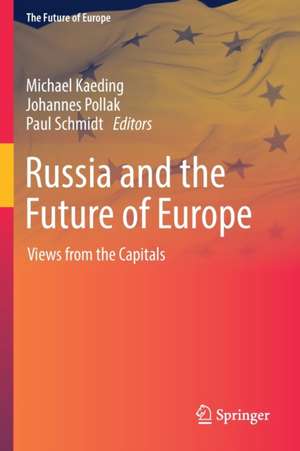Russia and the Future of Europe: Views from the Capitals: The Future of Europe
Editat de Michael Kaeding, Johannes Pollak, Paul Schmidten Limba Engleză Paperback – 7 iul 2023
| Toate formatele și edițiile | Preț | Express |
|---|---|---|
| Paperback (1) | 396.17 lei 3-5 săpt. | +17.57 lei 5-11 zile |
| Springer International Publishing – 7 iul 2023 | 396.17 lei 3-5 săpt. | +17.57 lei 5-11 zile |
| Hardback (1) | 500.59 lei 6-8 săpt. | |
| Springer International Publishing – 7 iul 2022 | 500.59 lei 6-8 săpt. |
Preț: 396.17 lei
Nou
Puncte Express: 594
Preț estimativ în valută:
75.83€ • 82.40$ • 63.74£
75.83€ • 82.40$ • 63.74£
Carte disponibilă
Livrare economică 31 martie-14 aprilie
Livrare express 15-21 martie pentru 27.56 lei
Preluare comenzi: 021 569.72.76
Specificații
ISBN-13: 9783030956509
ISBN-10: 3030956504
Pagini: 172
Ilustrații: XXI, 172 p. 1 illus.
Dimensiuni: 155 x 235 x 15 mm
Greutate: 0.28 kg
Ediția:1st ed. 2022
Editura: Springer International Publishing
Colecția Springer
Seria The Future of Europe
Locul publicării:Cham, Switzerland
ISBN-10: 3030956504
Pagini: 172
Ilustrații: XXI, 172 p. 1 illus.
Dimensiuni: 155 x 235 x 15 mm
Greutate: 0.28 kg
Ediția:1st ed. 2022
Editura: Springer International Publishing
Colecția Springer
Seria The Future of Europe
Locul publicării:Cham, Switzerland
Cuprins
Making Friends with Russia: Austria as a Solid Backer of Russia in the Eu.- Relations Belgium-Russia: Balancing Values and Interest.- Bulgaria-Russia Political Relations: Between Rethinking and Commitment.- Croatia’s Policy Towards Russia: To Be a Hawk for No Good Reason.- Cyprus and Russia: Strong Ties in a New Context.- the Czech-Russian Relations: From Bridge-building to Open Hostility.- Wide Fluctuations in Danish-Russian Relations.- Estonia and Russia: More Cooperation or Growing Tensions?.-Finland: Reckoning with a More Assertive and Authoritarian Russia.- France: What’s Behind the Macron Russia Initiative?.-(No) Wind of Change? - German-Russian Relations in the Post-Merkel Era.- Greco - Russian Relations: The Two Faces of “Janus”.-Hungary: More Business, Less Illiberalism.- Ireland: Reluctantly Re-thinking Russia.- Diplomatic Bridge but Hybrid Fist: Italy’s Possible Approach Towards Russia.- Latvian-Russian Relationship Status: ‘it’s Complicated’.- Lithuania’s Approach – Push-back Autocrats Back into Russia and Engage Democratic Activists.- Luxembourg: If You Cannot Tame the Bear, Talk to It!.- Malta-Russia Relations and the Libyan Civil War.- Poland and Russia: Turbulent Relations and No Rapprochement in Sight.-Portugal: Two Women’s Legacy - a Bridge Forged to Russia from the Western Edge of Europe.- Romania Vs. Russia: Black Sea Region Ambitions.- Slovak – Russian Relations: A Challenging Big Brother Legacy.- Russians Are Welcomed in Slovenia: As Artists, Tourists and Investors.- Spain’s Relationship with Russia: Out of Sight, out of Mind?.- Swedish – Russian Relations: Distrust and Tensions.- the Power of Attraction (Rather than Persuasion) - a Brief Enquiry into Dutch-Russian Relations.- Russian Influence: Is Albania the Odd One Out?.- Russia Vs. The West: Global Competition in the Local Setting of Bosnia and Herzegovina.- Caught in Between: Georgia’s European Aspirations under Russian Influence.- Icelandic-Russian Relations: Trade Determined by the Eu.-(Un)Shielded: Russia’s Western Balkans Influence Through the Kosovo-Serbia Open Dispute 89.- Liechtenstein’s Relations with Russia: Too Small to Be Noticed.- a Hot and Cold Power Struggle for Influence: Russia-Montenegro Relations.- North Macedonia and Russia – an Ambiguous Relationship.- Russia – Norway’s Best Frenemy.- Serbia and Russia: Continuity in a Changing Context?.- Switzerland: The Tedious Art of Bridging a Widening Gap.- Between Conflict and Compromise: Turkey-Russia Relations and the West.- the Approach to Russia for a Post-Brexit UK.- the Russian Shadow over Ukraine’s European Choice.- Laplacian.
Notă biografică
Dr. Michael Kaeding is Jean Monnet Professor for European Integration and European Union Politics at the Institute of Political Science of the University of Duisburg-Essen, Germany. He is visiting fellow of the European Institute of Public Administration in Maastricht and member of the flying faculties of the College of Europe, Bruges, and the Turkish-German University in Istanbul. Between 2016 - 2019 he was the chairman of the Trans European Policy Studies Association.
Dr. Johannes Pollak is Professor of International Relations and rector of Webster Vienna Private University, Austria. Prior to this position, he headed the Department for Political Science at the Institute for Advanced Studies in Vienna (on leave). In summer 2019, he was elected chairperson of the Board of the Institute of European Politics in Berlin.
Paul Schmidt is the Secretary General of the Austrian Society for European Politics, which promotes and supports analysis and communication on European affairs. Prior to that he has worked at the Oesterreichische Nationalbank, both in Vienna and at their Representative Office in Brussels at the Permanent Representation of Austria to the European Union.
Textul de pe ultima copertă
This book sheds light on how Member States and EU neighbours relate to Russia. It includes their historical, financial and political ties, as well as the public perception of the national population vis-à-vis Russia. Each chapter builds on these factors to elucidate the country’s position towards Russia and provides a prediction on the future of these relations. This volume shows the diverse relations that the EU member states and neighbours have with Russia, spanning from tense and confrontational to more eased and friendly, highlighting the contrasts between the national state and the EU as a whole. The book also presents the reader with concrete aspects in different policy areas, via recommendations on how single countries and the EU should deal with Russia. Russia’s invasion of Ukraine on 23rd February 2022 will change the relationship between the West and Putin’s Russia for decades to come. No doubt that this blatant violation of International Law and the incomprehensible human suffering of Ukrainian citizens will massively change the attitude of the countries analysed in this book.
Caracteristici
Provides data on EU´s historical, financial and political ties to Russia Includes recommendations on how policymakers should deal with Russia in the future Presents insights from over 40 countries in the EU and its neighborhood





